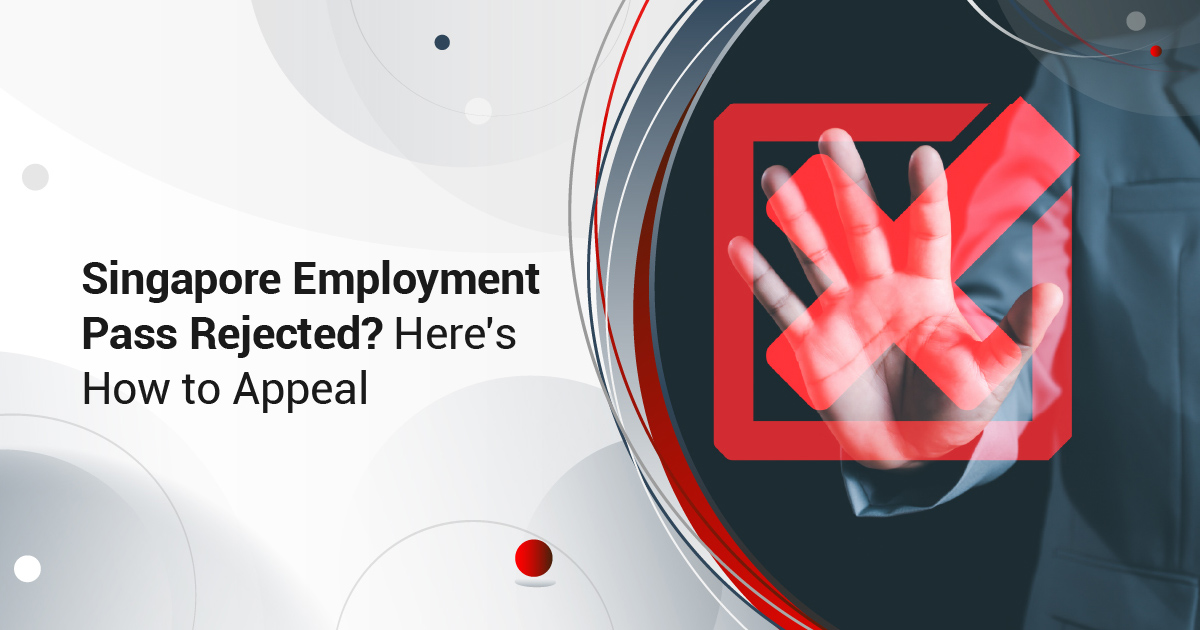As an employer in Singapore, securing top foreign talent is often crucial for driving innovation and growth. You invest significant time and resources into finding the right candidate, only to face a major hurdle: a rejected employment pass application from the Ministry of Manpower (MOM). This outcome can be frustrating, but it is not necessarily the final word. A well-prepared appeal can turn a rejection into an approval.
A rejected application can be disheartening, yet it is not the end of the road. Understanding the Singapore employment pass appeals process is essential for turning a rejection into an approval.
This guide explains the common reasons for employment pass rejections, outlines what to expect during the appeals process, and provides practical steps to strengthen your employees’ case. Navigating this landscape effectively can significantly improve your employees’ chances of a successful outcome.

Key Takeaways
- Common reasons include salary below market rate, mismatched candidate qualifications, weak company profile, or incomplete applications. Analysing MOM’s feedback is crucial for addressing these issues in your appeal.
- Review the rejection advisory, identify weaknesses, and prepare a clear, evidence-backed appeal letter. Submit the appeal via the EP Online portal within the 3-month timeframe.
- Provide updated documents, such as a revised job description, higher salary offer, or additional proof of the candidate’s unique expertise. Highlight the candidate’s value and your company’s contributions to Singapore’s economy.
- Start the appeal process early to allow time for preparation, but avoid rushing. Ensure all documentation is accurate, complete, and aligned with MOM’s requirements.
- For complex cases or critical hires, engaging a corporate services firm or immigration specialist can improve your chances of success by providing expert guidance and managing the process efficiently.
Why Do Singapore Employment Pass Applications Get Rejected?
The Ministry of Manpower (MOM) evaluates each application against a comprehensive set of criteria to ensure that foreign hires complement the local workforce. A rejection often signals a mismatch between the candidate’s profile and MOM’s requirements. Understanding the specific reason for denial is the first step in building a successful appeal.
Common reasons for rejection include:
- Salary Below Market Rate: The offered salary is a primary indicator of the job’s value. If the proposed compensation does not align with the industry benchmark for a candidate with similar experience and qualifications, MOM may reject the application.
- Mismatched Candidate Profile: The candidate’s educational background and professional experience must clearly align with the job description. A vague or inconsistent application can raise doubts about the necessity of the hire.
- Weak Company Profile: MOM assesses the hiring company’s commitment to the local workforce. A high concentration of foreign employees, a limited hiring history, or a weak financial track record can negatively impact an application.
- Insufficient Justification for Hiring a Foreigner: Employers must demonstrate that they have made a genuine effort to hire locally. If the role does not appear to require specialised skills that are unavailable in the Singaporean talent pool, the application may be denied.
- Incomplete or Inaccurate Application: Simple errors, such as missing documents, inconsistent data, or incorrect information, are common and avoidable reasons for rejection.
MOM typically provides a general reason for the rejection. Carefully analysing this feedback and cross-referencing it with the original application will help you identify the specific weaknesses that need to be addressed in your appeal.
What to Expect During the Singapore EP Appeal Process

An appeal is not simply a request for MOM to reconsider its decision. It is an opportunity to provide new and compelling information that directly addresses the reasons for the initial rejection. The process must be handled systematically and professionally.
Step 1: Review the Rejection Advisory
Once an application is rejected, MOM issues a rejection advisory through the EP Online portal. This notice contains crucial information, including the reason for the rejection and the timeframe for submitting an appeal. You have 3 months from the date of rejection to file an appeal. After this period, you must submit a new application.
Step 2: Identify and Address the Weaknesses
Before writing the appeal, conduct a thorough review of the original application. Compare the candidate’s qualifications, the proposed salary, and the job responsibilities against MOM’s stated requirements and the rejection reason.
For instance, if the rejection was due to a salary mismatch, you may need to revise the offered compensation to align with industry benchmarks. If the candidate’s qualifications were deemed insufficient, your appeal should highlight specific skills, certifications, or project experiences that were not adequately emphasised in the initial application.
Step 3: Prepare the Appeal Letter and Supporting Documents
The appeal letter is the core of your submission. It should be clear, concise, and persuasive. Structure the letter professionally, addressing the MOM officer directly. Your employee’s appeal letter should:
- Acknowledge the Rejection: State the application reference number and the date of rejection.
- Address the Issue Directly: Explain how you have resolved the specific problem cited by MOM. For example, “In response to the feedback regarding the candidate’s qualifications, we have attached a portfolio of their work and letters of recommendation from previous employers.”
- Provide New Information: An appeal must present new facts or documents. Simply resubmitting the same information will result in another rejection. This could include a revised job description, a higher salary offer, or additional proof of the candidate’s unique expertise.
- Justify the Hire: Reiterate why the candidate is the right fit for the role and how they will contribute to the company and Singapore’s economy. Emphasise skills that are in short supply locally.
Gather all relevant new documents to support your claims. This may include additional educational certificates, detailed project descriptions, industry awards, or a revised employment contract reflecting a higher salary.
Step 4: Submit the Appeal Online
The appeal must be submitted electronically by you, the employer, or an authorised third party via the EP Online portal. There is no official government fee for filing an appeal. Once submitted, the processing time is typically around 6 weeks, although complex cases may take longer. It is important to remain patient and avoid contacting MOM for status updates unless the processing time has significantly exceeded this estimate.
Tips for a Successful Work Pass Appeal

A well-prepared appeal demonstrates professionalism and a genuine commitment to complying with MOM’s standards. Following these tips can substantially increase your chances of a favorable outcome.
1. Act Promptly but Not Hastily
While you have three months to appeal, it is best to act quickly while the details are still fresh. This allows ample time to gather necessary documents and construct a strong argument. However, avoid rushing the process. A hastily prepared appeal is unlikely to succeed.
2. Be Specific and Factual
Base your appeal on facts and evidence. Vague statements or emotional pleas are ineffective. Use concrete examples and quantifiable achievements to showcase the candidate’s value. For example, instead of saying the candidate is “highly skilled,” state that they “led a project that increased team efficiency by 25%.”
3. Emphasise the Candidate’s Unique Value
Clearly articulate what makes the foreign candidate exceptional. Go beyond the job description and highlight specialised skills, international experience, or a proven track record of success that is difficult to find locally. Use quantifiable achievements to support your claims (e.g., “managed a regional project that generated S$2 million in revenue”).
4. Highlight the Company’s Merits
Demonstrate that your company is a positive contributor to Singapore’s economy. In your appeal, you can highlight:
- The number of Singaporean citizens and Permanent Residents you employ.
- Training programs or skills-upgrading initiatives for your local staff.
- Partnerships with local universities or industry associations.
- Your company’s role in driving innovation or growth within its sector.
5. Ensure All Documentation is Flawless
Double-check every document for accuracy and completeness. Ensure that all forms are filled out correctly and that the information provided is consistent across the entire application. Small errors can undermine the credibility of your appeal.
When to Seek Professional Help
Managing an appeal can be a demanding task, especially when your HR team is already stretched thin. While you can handle the process in-house, partnering with a corporate services firm or immigration specialist such as InCorp offers distinct advantages.
A professional can:
- Provide an expert assessment of the rejection reason and formulate a targeted strategy.
- Leverage up-to-date knowledge of MOM’s policies and salary benchmarks.
- Craft a persuasive appeal letter that speaks to MOM’s priorities.
- Manage the entire process, freeing your team to focus on core business functions.
Consider seeking professional help if the case is complex, if the hire is business-critical, or if you have faced previous rejections.
Navigating Forward With Confidence
An employment pass rejection is a challenge, not a final verdict. By approaching the appeals process with a clear strategy, meticulous preparation, and a professional attitude, you can effectively address MOM’s concerns and successfully secure the talent your business needs.
Whether you handle the process in-house or engage an expert, a well-crafted appeal is your best tool for navigating Singapore’s dynamic employment landscape. For professional advice, our experts at InCorp can help. Talk to us today to find out more!
FAQs about Appealing for Singapore Work Pass Rejection
Why is the employment pass rejected in Singapore?
- An EP application in Singapore may be rejected for several reasons, as MOM evaluates each application against strict criteria to ensure foreign hires complement the local workforce.
What is the rejection rate for the Singapore Employment Pass?
- The rejection rate for Singapore Employment Pass (EP) applications can vary depending on factors such as the applicant's qualifications, the employer's profile, and compliance with Ministry of Manpower (MOM) guidelines.
What are some Singapore Employment Pass rejection reasons?
- Reasons may include a mismatched candidate profile or insufficient justification.


